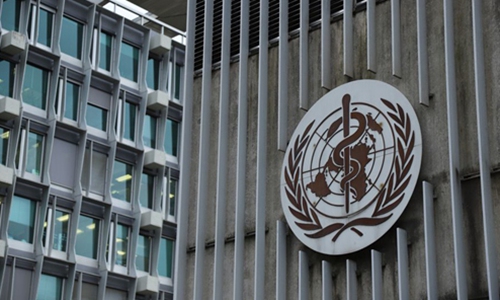Taiwan island will fall flat as US puppet: Global Times editorial
Source:Global Times Published: 2020/5/12 20:30:12

Photo taken on January 30, 2020 shows the headquarters of the World Health Organization in Geneva, Switzerland. Photo: Xinhua
The island of Taiwan is campaigning furiously to attend the World Health Assembly (WHA) meeting to be held from May 18 to 19. However, the situation does not favor it.Eight countries, including the US, jointly penned a letter to the World Health Organization (WHO) saying its director-general, Tedros Adhanom Ghebreyesus, can invite Taiwan as an observer to the WHA. However, the WHO responded explicitly that the director-general doesn't have the power to do so without the support of all WHO member states.
Thirteen of Taiwan's "diplomatic" allies have called for an invitation to the island. But the WHO has 194 member states. The US should have known that the number of countries supporting the island as an observer is far from sufficient, so it just rallied some allies to pen a letter to not let the "Taipei Act" down.
The Chinese central government has criticized island of Taiwan's move as using the ongoing coronavirus pandemic to seek "independence." There are many ways that the island can share its anti-virus experience, if any, with the rest of the world. The Chinese mainland has never interfered in Taiwan's technological exchanges with the WHO.
Under the rule of Ma Ying-jeou, Taiwan joined the WHA meeting as an observer under the title of "Chinese Taipei." At that time, the 1992 Consensus was endorsed across the Straits, and one China was ensured. But Tsai Ing-wen authorities refuse to admit the 1992 Consensus and their intention to participate in the WHA meetings is politically driven. They will by no means be given the chance.
As Washington is determined to use the Taiwan card to target Beijing, more US-provoked troubles regarding the island can be anticipated. The US has the strength and international mobilization ability to create waves. China should adopt different approaches and strengths to rival the US in this regard.
What works for China is that the one-China principle has been universally acknowledged and is one of the foundations of the existing international order. Sticking to this principle is sticking to rules and morality.
As for the US, its leverage lies in three aspects. First, the authorities of the Democratic Progressive Party (DPP) in Taiwan collude with the US; second, the US and its Western allies control the international discourse power; and third, with its strength, the US can coerce some countries to make them act in favor of the island of Taiwan.
If the US agitates the Taiwan Straits with current tactics, it will have a limited impact on the one-China structure. But if it plays the Taiwan card with real actions, China may be propelled to strike back at whatever cost.
Taiwan is a focal point of China-US rivalry that poses challenges to the two major world powers. It is important that Chinese society supports any action that China takes to safeguard its sovereignty. Yet, it is unrealistic to expect China to win in each round.
The Chinese mainland's ability to resolve the Taiwan question via military means is becoming mature. Its comprehensive strength to cope with changes surrounding the question is also increasing. This is the foremost change in the situation vis-à-vis the Taiwan Straits. It is Beijing that tightly steers the wheel of the Taiwan Straits.
Taiwan's so-called independent diplomacy has met its demise. The island is trying to return to the international stage as a US puppet, but it could only see mirages. Unless DPP authorities could move the island into the Caribbean Sea, its free ride of the US will eventually make it fall.
Posted in: EDITORIAL